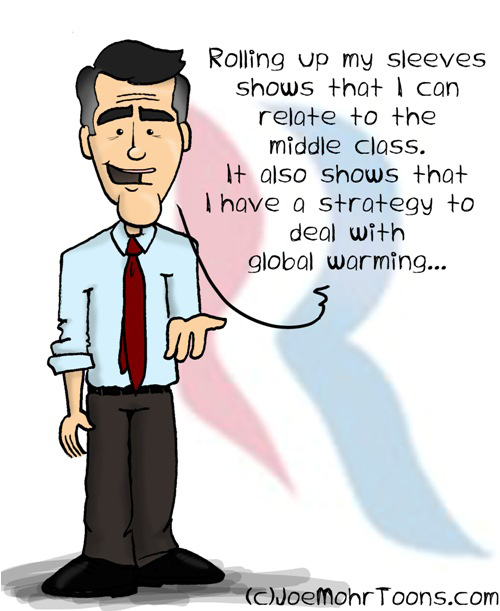2012 SkS Weekly Digest #43
Posted on 29 October 2012 by John Hartz
SkS Highlights
Two of Dana's posts, Rose and Curry Double Down on Global Warming Denial and Climate of Doubt and Escalator Updates, were tied for the most number of comments posted by SkS readers during the week.
Technical Glitches
SkS apologizes for the difficulties many users experienced in accessing the site during the past week. On Sunday last, the site was transferred to a new host server and certain technical glitches ensued. Most have been ironed out.
Toon of the Week

What say you?
When and how did you first become concerned about manamde climate change and its consequences?
Quote of the Week
"Many political observers are not especially surprised that climate change has gotten short shrift in this campaign. In general, environmental concerns tend to rise in the public mind in times of prosperity and sink in hard times. And polling suggests that, while most voters believe climate change is real, they see it as a long-term threat and therefore put it far down their list of priorities for action."
Source: The Issue That Dare Not Speak Its Name by Justin Gillis, New York Times, Oct 23, 2012
The Week in Review
- Hurricane Sandy: Neither weather nor tide nor sea level can be legislated by Doug Bostrom
- 2012 SkS Weekly News Round-Up #7 by John Hartz
- Climate of Doubt Shines a Light on the Climate Denial Movement by Dana
- Big Oil and the Demise of Crude Climate Change Denial by Andy S
- Global Dimming in the Hottest Decade by Rob Painting
- Climate of Doubt and Escalator Updates by Dana
- Rose and Curry Double Down on Global Warming Denial by Dana
- New research from last week 42/2012 by Ari Jokimäki
Coming Soon
- Climate of Doubt Strategy #1: Deny the Consensus (Dana)
- The View from Germany: Tackling the real questions (gws)
- Fred Singer - not an American Thinker (John Abraham and Dana)
- 2012 SkS Weekly News Round-Up #8 (John Hartz)
- Drost, Karoly, and Braganza Find Human Fingerprints in Global Warming (Dana)
- DIY climate science: The Instrumental Temperature Record (Kevin C)
SkS in the News
In the most exciting example of SkS in the news this week, The Escalator was featured on the excellent PBS Frontline program Climate of Doubt.
The Debunking Handbook and Lewandowsky et al. (2012), co-authored by John Cook, were featured in a RealClearReligion post.
Dana's Matt Ridley - Wired for Lukewarm Catastrophe was quoted in the November 2012 issue of WIRED magazine.
Dana's Rose and Curry Double Down on Global Warming Denial was endorsed as "an excellent post" by Tamino on Open Mind.
Enivronment Guru reposted both last week's new research and weekly digest posts.
Michael Mann endorsed SkS as one of the go-to sites for real-time debunkings of climate nonsense.
SkS Spotlights
The Earth System Science Partnership (ESSP) is a joint initiative of four international global environmental change research programmes:
- DIVERSITAS - an integrated programme of biodiversity science
- IHDP - International Human Dimensions Programme on Global Environmental Change
- IGBP - International Geosphere-Biosphere Programme
- WCRP - World Climate Research Programme
The Partnership allows for an integrated study of the Earth System, the ways that it is changing, and the implications for global and regional sustainability.
The central activities of the ESSP are Joint Projects on issues of global sustainability, designed to address the global environmental change aspects of four critical issues for human well-being: energy and the carbon cycle (GCP), food security (GECAFS), water resources (GWSP) and human health (GEC&HH). The ESSP is also currently developing a small set of Integrated Regional Studies (IRS), designed to contribute sound scientific understanding in support of sustainable development at the local level. The first study is in Monsoon Asia (MAIRS). The Joint Projects, START and MAIRS all have a strong suite of capacity building and networking elements to their activities. ESSP Partners also collaborate closely with the Asia-Pacific Network for Global Change Research (APN) and the Inter-American Institute for Global Change Research (IAI).































 Arguments
Arguments























 0
0  0
0






Comments